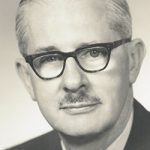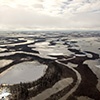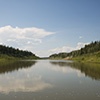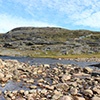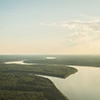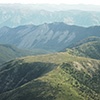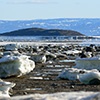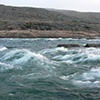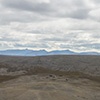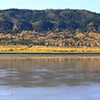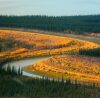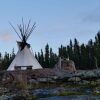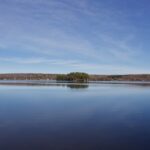1965
In 1965 The Walter and Duncan Gordon Foundation was established by brothers Duncan and Walter Lockhart Gordon and Walter’s wife Elizabeth Gordon. Foundation objectives were broadly defined as: “to promote, assist and engage in charitable work throughout Canada.”
Founders
Walter Gordon
Born in Toronto on January 27, 1906, Walter Lockhart Gordon was the oldest of the three sons and two daughters of Lt. Colonel Harry Duncan Lockhart Gordon and Kathleen H. Cassels.
Gordon’s father served with distinction in World War I, and his wife and his two oldest children (Walter and Hugh) spent several of these years (1915-1918) in England where they attended the Grange preparatory school. Gordon noted that it was during this period that he experienced a nascent sense of his Canadian identity. While attending school in England, he contracted polio. The disease affected his vision and paralyzed some of his facial muscles.
On their return to Canada, Walter Gordon followed in his father’s footsteps, attending Upper Canada College in Toronto and then the Royal Military College of Canada in Kingston.
In 1927 he joined the family accountancy firm Clarkson, Gordon and Company and was made partner in 1935.
In 1939, on the eve of World War II, Gordon, known as the ‘figure wizard’ was commandeered to help establish the Foreign Exchange Control Board. During the war years, he was special advisor to the deputy minister of finance. In 1946, he chaired the Royal Commission on Administrative Classification in the Public Service. In the immediate post-war years he also helped reorganize Ontario Hydro, paving the way for its future development.
In 1955, Gordon, a member of the Board of Governors of the University of Toronto and past president of the Toronto Board of Trade, was asked by Prime Minister St. Laurent to chair a royal commission on Canada’s long-term economic prospects.
The Gordon Commission, created in response to the rising tide of foreign ownership in the Canadian economy, addressed concerns that were revisited by Gordon throughout his career and were later reflected in the establishment of the Foundation.
In the 1962 federal election, Gordon was elected to the House of Commons as a Liberal for the riding of Toronto-Davenport in the government of Prime Minister Lester B. Pearson. He served as Minister of Finance between 1963 and 1965, and President of the Privy Council from 1967-1968. These years were characterized by his ongoing concern over Canada’s control of its economy and his support for new social programs.
In 1968, after declining an invitation to join the government of the newly elected Prime Minister Pierre Trudeau, whose leadership he had supported, Gordon returned to his business career. However, he continued to argue for greater Canadian control of the country’s economy and in 1970, was instrumental in helping to establish the Committee for an Independent Canada. The CIC, active until 1981, included members from a broad array of professions and all three major political parties. The Committee published a number of books on economic nationalism and overall, achieved many of its goals.
Gordon also served as Chair of the Canadian Institute for Economic Policy between 1978-1984, as Chancellor of York University from 1973 -1977, and as a Senior Fellow at Massey College from 1973-1978.
Walter Gordon was an inspiration to more than one generation of Canadians and he is still remembered today for his unwavering defense of Canada’s economic independence and sovereignty. His philanthropic legacy continues to serve as a shining example of his and his family’s, commitment to the public good. This commitment is in integral to the ongoing work of the Foundation’s Directors and staff.
Walter Gordon’s passion for public policy drove a large part of the Foundation’s grant making in the early years. For example, support was provided to the Canadian Institute on Public Affairs, Canadian Institute on Economic Policy, the Canadian Institute of International Affairs and Massey College, where Walter Gordon served as a Senior Fellow. Following in this legacy, the Foundation endowed the Walter Gordon Forum on Public Policy in 1990, now a much-anticipated yearly event at Massey College.
Walter Gordon was widely known and respected for his principled commitment to his country and his generous philanthropy. Among other honours, he was made a Commander of the British Empire and a Companion of the Order of Canada.
Duncan Gordon
Born in 1914, Duncan Lockhart Gordon was the third son of Lt. Colonel Harry Duncan Lockhart Gordon and Kathleen H. Cassels’ five children. Like his father and two older brothers, he was educated at Upper Canada College in Toronto and the Royal Military College in Kingston.
He served in uniform from the beginning to the end of the Second World War—more than six years—and rose to the rank of Lt. Colonel. While fighting with Canadian forces in Italy, Duncan was wounded at the battle of Monte Casino. He was awarded the Member of the British Empire (MBE) medal as well as the Italy Star and other military campaign decorations
On his return from Europe after WWII, Duncan Gordon joined Clarkson, Gordon & Company where he became a senior partner and ran the company after his brother entered politics.
Although he had a quieter public profile than Walter, he was passionately involved with the development of the Hospital for Sick Children and served for many years as Chair of its board of directors.
His interest in health issues is reflected in the work of the Foundation between 1965 and 1987. Its beneficiaries included the Canadian Institute for Child Health, St. John Ambulance, Montreal General Hospital, Toronto General Hospital, St. Michael’s Hospital Fund, National Mental Health Fund, the Canadian Paraplegic Association, the Lupus Association, Dying with Dignity, Hospice King and the Casey House Hospice.
In 1987 he was awarded the Order of Canada.
Elizabeth Gordon
With her keen intellect, strong sense of one’s role and responsibilities in the wider society and boundless energy, Elizabeth Gordon achieved great influence within her family, the Toronto art world of her times.
She was a passionate supporter of her husband, Walter Gordon’s interests and career and played a key role in the profile of The Gordon Foundation. Her passions, in addition to friends and family, included art, museums – for showing and sharing art – and the public value of good design. One of her major contributions to The Gordon Foundation was to insist on grants for the arts.
Elizabeth Marjorie Leith (Counsell) Gordon was born in Hamilton, Ontario. She was the granddaughter of George Gibbons, QC, a barrister from London, Ontario, who crafted the International Boundary Waters Treaty of 1908 between the United States and Canada. The Treaty remains extant and defines the obligations and international boundary line through the Great Lakes – the substance of which later became central to the Gordon Foundation Program on Water Issues.
She attended private schools and then traveled to Europe as part of her ongoing education. It was there that she developed a lifelong interest in art, history and culture. Elizabeth studied art and sculpture in Paris and, upon returning to Canada, continued her studies with Frances Loring and Florence Wylde.
She returned to Canada to marry Walter Gordon – who was just starting in the family firm. She and Walter had three children: Kyra, Jane and John.
Following the birth of her second daughter, Jane, and with the outbreak of the WWII, the family moved to Ottawa. Around that time, her brother John was seriously wounded at Dieppe. As a result of those changes, Elizabeth did not continue her own personal artistic career.
For many years, Elizabeth led or was active with the Women’s Committee at the Art Gallery of Toronto – now the Art Gallery of Ontario (AGO). In her own words she defined their mission as follows: “to stimulate interest in the Gallery, and to increase its membership.”
To that end, she and the Committee inaugurated a number of activities. These included — among many others — Gallery luncheons that were held after every opening. Committee members were responsible for cooking and serving the lunches, for which they charged a dollar. They also instituted a series of lectures on everything from flower arranging to old china to Picasso, an annual painting and sculpture sale, as well as tours of artists’ studios.
Many of the AGO’s most prized paintings and sculpture are testimony to her determined leadership, resolute fundraising and connoisseur’s eye. Elizabeth reached out beyond the role of arts patron to establish warm and enduring friendships with many leading Canadian artists of her generation.
Until the early 1990s, Elizabeth encouraged emerging art galleries and museums across Ontario by providing support through the Foundation to enable the purchase of original works of art. The first arts grant was made in 1969 to the AGO. The Foundation also contributed to the Toronto Dance Theatre, the Shaw Festival and the Tarragon Theatre, co-founded by her daughter Jane Glassco.
In Elizabeth’s memory, the Foundation continues the Elizabeth L. Gordon Art Program, which enables public galleries in Ontario to expand their collections. An evaluation of the Art Program, undertaken in 2000, strongly affirmed the impact of this modest matching grants program.
Throughout their marriage, Elizabeth was Walter Gordon’s strong support. They shared a passion for discovery and travelling around the world to see for themselves how different people and countries worked. However, nowhere were they happier than at their country property north of Toronto – which they transformed from swamps and bald glacial moraine land into a dense forest with splendid gardens and productive fields; a protected natural environment, and testament to their love of the land and their country.
Kyra L. Montagu
Kyra Montagu is a practicing psychotherapist and psychoanalyst in Cambridge, Massachusetts after a previous career developing many different kinds of programs with both museums and artists in the Boston area. She has become increasingly interested recently in issues affecting refugees and their livelihoods.
Kyra is married to Jean (Coco) Montagu and is the mother of Sasha and Dominic Montagu.
John Gordon
The youngest of the Gordon children, John Gordon was born in 1946 and followed in his father Walter’s footsteps forging a career as a Chartered Accountant and later, as an award winning Land Developer. John’s involvement in The Foundation began as it was reinventing itself in the mid- to late-eighties following the deaths of Walter and Duncan in 1987.
As each of the Gordon children assumed a leadership position and individual focus within The Foundation, John’s a passion for education emerged; with a specific focus on improving Canadian public schools and supporting at risk youth. He led the education program at the Gordon Foundation for eight years, championing many successful initiatives including, “Student Voices,” a study of how to boost student confidence and the conference “Listening to the Voices” that followed.
It was John’s work on the Manitoba School Improvement Program (MSIP) that best reflected his passion, business style, and commitment. Designed to be simple, direct and innovative, the MSIP was launched in 1990 to support all worthwhile programs or initiatives conceived by Winnipeg educators to enhance their students’ learning experience. At the time, Manitoba had yet to standardize public education and John recognized the opportunity for innovation and improved experiences for students and educators.
John Gordon passed away on October 16, 2015. He played an integral role in the modernization of The Gordon Foundation and his passion for education has carried forward to today through the Jane Glassco Northern Fellowship program. John’s passion continues to serve as inspiration and the Glassco Fellows embody all that John stood for: dynamic young leaders committed to the prosperity and independence of their communities and ways of life.
Jane Glassco
Through her tireless work with The Gordon Foundation, Jane Lockhart Glassco (nee Gordon) brought awareness of aboriginal communities, ideas and projects from the North to the attention of the philanthropic community. Her keen mind and passionate nature gave her voice on improving education in Canada, as well as strengthening our sovereignty over Canada’s water and northern borders, to better protect both natural resources and aboriginal rights.
“Jane shaped one of the best known and long-lasting philanthropic foundation legacies in this country. She never wavered in her commitment to the north and its people, and showed a keen interest in what people on the ground, in the communities, had to say, not in what the experts and political leaders had to say. Way, way, ahead of the curve in the way she thought about social change” said James Stauch, former vice-president of The Gordon Foundation, who worked alongside Jane for many years.
Along with her dedication to the North through The Gordon Foundation, Jane helped found Tarragon Theatre, contributing her instinct for spotting fine writing by then-unheard of Canadian playwrights, and pioneering Pay What You Can matinees, thereby making quality theatre more accessible to all Canadians.
She then moved into journalism, breaking a front page environmental story about Scarborough housing developments built knowingly over an abandoned nuclear waste dump.
At the CBC, she was a brave and tenacious investigative reporter and producer, first for Marketplace, and then as a producer of award-winning stories for Wonderstruck. Jane showed her passion for Canada and for people in her documentary series ‘Our Stories’, focussing on the positive impacts on Canadian life made by so many individuals from different immigrant and aboriginal groups. Jane was probably most proud of her work as an activist and environmentalist.
Jane passed away peacefully at her home on April 28, 2010, surrounded by her family and friends.
Following her passing, The Gordon Foundation honoured Jane by launching the Jane Glassco Northern Fellowships, whose purpose is to help link young northerners with support to build their own futures and amplify their voice on public policy issues.
She showed true stewardship of the land in transforming her family farm, protecting over 300 acres of what was once eroded and abandoned fields into woodlands, meadows and wetlands which now form the core of the Oak Ridges Moraine Land Trust. She was given the 2007 Charles Sauriol Environmental Award by Robert Kennedy Jr. in recognition of her conservation gift to the people of Ontario.
Jane lived many roles in life: daughter, sister, mother, grandmother, mother-in-law, sheep farmer, wild “flower child” and surrogate family to many, many friends. She embraced the world in many ways, from her early passion to be a doctor, to her astounding efforts in theatre, journalism, filmmaking and community activism. Her evolution into an organic lamb farmer, environmentalist and activist/ philanthropist was a beautiful synergy of her passions. Throughout her life she was a mentor who inspired innovation & compassion, taking risks and showing respect.
Everyone who came to know her was touched by her colourful character, compassion, love, and unabashed honesty, wily mischievousness, unforgivable humour and her reverence for art, life and the natural world and the need to protect it. And trudge around in it a bit.
1966
In 1966, during the early days of the Foundation, the founders each had a personal focus for their giving related closely to their personal and professional passions: for Walter, that was public economic policy; for Duncan, healthcare and services to remote locations in the North; and for Elizabeth, the arts. Much of the Gordon Foundation’s early activity focused on providing grants and funding related to these distinct fields.
1969
In 1969 the first Gordon Foundation arts grant was made to the Art Gallery of Ontario. Elizabeth Gordon avidly supported the arts and guided the Foundation’s focus in this field up to the early 1990s.
1970
In 1970 Walter and Elizabeth Gordon’s adult children – Kyra, Jane, and John – were added as Foundation trustees, taking on active roles in the ongoing management and strategic direction of the Foundation.
1972
In 1972 The Gordon Foundation supported the Committee for an Independent Canada, reflecting Walter Gordon’s devotion to the ideal of Canada’s economic independence.
1973
Building on his commitment to improved healthcare, Duncan Gordon served as Board Chairman for the Hospital for Sick Children from 1973 – 1984. Starting as a Trustee in 1955, Duncan served on the board for 28 years.
1980
After supporting numerous peacekeeping, peacemaking and nuclear disarmament initiatives throughout the 70s, The Gordon Foundation formalized a Peace and Security program in 1980. Between 1980 and 1998, grants were made to 46 organizations addressing peace and security issues.
1981
In 1981 The Gordon Foundation supported Pollution Probe. This initial grant lead to a multi-year partnership with the Coalition on Acid Rain, reinforcing the Gordon family’s early interest in addressing Canadian environmental issues.
Today Pollution Probe remains a leading organization with a focus on communities, health and the environment.
1987
In 1987, brothers and founding members of The Gordon Foundation, Walter and Duncan Lockhart Gordon passed away within 8 months of each other.
Following the passing of Walter and Duncan, Walter and Elizabeth Gordon’s children Kyra Montagu, Jane Glassco, and John Lockhart Gordon assumed leadership of the Foundation and Board.
1989
In 1989 Donald S. Rickerd was named Gordon Foundation Executive Director, serving in that role until 1990. As Executive Director, Mr. Rickerd’s focus was on grants for Education (Grant to Dalhousie Law School students of Indigenous descent); for Peace and Disarmament (Grants to the Canadian Centre for Arms Control and Disarmament, the Canadian Institute for International Affairs); for Northern Issues (Grant to United Nations Association of Canada for a global seminar on circumpolar security); and for the Arts (Grants to Canadian Native Arts Foundation, Art Gallery of Hamilton).
Also in 1989, The Gordon Foundation launched a formal Education program led by John Gordon. Over the next 11 years, the program focused on strengthening public education at the secondary school level across Canada.
The Manitoba School Improvement Program (MSIB) became the centerpiece of the Foundation’s early education interests with a goal of improving the learning experiences and outcomes of junior and senior high school students in Manitoba – particularly those at risk – by building schools’ capacity to engage students in their own learning.
1990
In 1990 the Foundation endowed The Walter Gordon Forum on Public Policy at Massey College, building on Walter’s longstanding passion for public policy.
Also in 1990, the Foundation appointed Christine Lee as Executive Director replacing Donald S. Rickerd. Ms. Lee served in this capacity until 2002, focusing the Foundation’s granting towards Education; Arctic Security; the Arts; and Environmental Protection.
1991
The Arctic Environmental Protection Strategy (AEPS) was born, following meetings between officials of the eight Arctic nations to discuss Arctic environmental protection measures.
The AEPS encourages cooperation on monitoring, assessment, protection, emergency preparedness/response, and conservation in the Arctic. It has been called a major political accomplishment of the post–Cold War era representing a broad, multinational agreement to protect the environment.
1996
In 1996, the formal creation of the Arctic Council, signed by the eight Arctic nations and Indigenous representatives took place in Ottawa.
At the time, the Minister of Foreign Affairs, Lloyd Axworthy thanked “the co-chairs of the Arctic Council panel set up in 1990 with the support of The Walter and Duncan Gordon Foundation, and the members of the panel for their efforts that laid out the ground work for this day.”
A distinctly Canadian contribution to world peace, The Arctic Council continues to operate to this day maintaining permanent Indigenous participation and consensus decision making.
1997
“Voices from the Bay” is published as a result of a three-year study funded by The Gordon Foundation involving the 28 Inuit and Cree communities surrounding Hudson’s Bay and James Bay.
The groups met and gathered together for the first time in history to respond to the anticipated construction of Hydro Quebec’s project on the Great Whale River. Voices from the Bay has since been recognized nationally and internationally as a landmark in the use and communication of traditional Indigenous environmental knowledge.
2001
In 2001, The Gordon Foundation helped create the Program on Water Issues (POWI) at the Munk School of Global Affairs at the University of Toronto, bringing together scientists, experts and policy makers to both assess the state of Canada’s water resources and to promote public education on water priorities.
As the founding funder of POWI, The Gordon Foundation is proud to have invested in POWI’s mission to create opportunities for members of the private, public, academic, and not-for-profit sectors to join in collaborative research, dialogue, and education. The foundation concluded its funding of the program in 2016.
Also in 2001, the Foundation supported the creation of the Akitsiraq Law School, where a four year program delivered a Canadian law degree with a strongly Inuit cultural context for students in the region.
2002
In 2002, The Gordon Foundation named Patrick Johnston President and CEO, taking over from former Executive Director, Christine Lee.
As President and CEO, Mr. Johnson refined the Foundation’s focus to include a Global Youth Fellowship Program, as well as granting for Water and Northern Issues. Mr. Johnson served as President and CEO from 2002 to 2009.
2005
The Gordon Foundation released “Buried Treasure: Groundwater Permitting and Pricing in Canada” by Linda Knowlan in 2005.
The publication shed light on the reality that 80% of Canadians rely on groundwater while outlining specific threats to groundwater sustainability and the public policy required to protect it.
2007
In 2007, the Foundation brought together a variety of experts to contribute to the publication, “Changing the Flow: A Blueprint for Federal Action on Freshwater.” From this collaboration, emerged the Forum for Leadership on Water (FLOW), a membership of non-partisan water experts that continues to actively research and protect freshwater resources and ecosystems.
Also in 2007, following an exploratory Town Hall meeting with community leaders and global experts in Fort Good Hope, NWT, work began on developing the IBA Community Toolkit. The goal of the toolkit – which was updated in 2015 – is to help communities, negotiators, and consultants achieve positive benefit agreements for Indigenous communities negotiating land claims or resource development.
2008
POWI, with support from The Gordon Foundation, and the Canadian Water Issues Council develop a model federal statue to preserve Canada’s water from bulk exports in 2008. This work would later contribute to the passage of Bill C-383 in 2013, an act to amend the International Boundary Waters Treaty Act and the International River Improvements Act designed to prohibit and prevent bulk water exports.
Also in 2008, the Foundation received the International Funders for Indigenous Peoples (IFIP)’s annual award “in recognition of … efforts to support First Nations, Inuit and other Northern Peoples to shape public policy reflective of and reinforcing cultural priorities and traditions.”
2009
In 2009, long-time Foundation adviser, Tom Axworthy was named The Gordon Foundation’s President and CEO, taking over from Patrick Johnson and serving in this role from 2009 to 2015.
Facing constrained financial resources due to the global economic downturn, Mr. Axworthy moved the Foundation into an operational model characterized by the internal management of Foundation-developed initiatives.
2010
The Dechinta Bush University was launched and in 2010, with 38 students participating in a six week winter/spring term. The Gordon Foundation supported the creation of the University, funding the development of an economic and academic plan to support the feasibility of Dechinta and holding an initial pre-launch conference on the project.
Later, in partnership with the Munk School of Global Affairs, The Gordon Foundation launched the Munk-Gordon Arctic Security Program, incorporating a broad definition of security to include environmental sustainability, emergency preparedness, food and health security, sovereignty and diplomacy. The program was launched with “Rethinking the Top of the World,” a publication summarizing attitudes on northern issues from all eight Arctic Council member states, capturing worldwide media attention.
Finally, in 2010 The Gordon Foundation launched one of the most ambitious programs in its history, the Jane Glassco Northern Fellowship, with a goal of improving leadership capacity through rich educational opportunities in the North. Participants are selected to take part in two year public policy program, taught largely in the North. Ultimately the skills learned are applied to a northern policy agenda. The Fellowship program remains one of the largest current investments by The Gordon Foundation and remains a centrepiece of our northern commitment.
2011
In 2011, The Gordon Foundation released, “Canada’s Great Basin” a report on the Mackenzie River Basin, intended to educate a general audience on the importance of the Mackenzie watershed for the environmental sustainability of the continent.
The Gordon Foundation, WWF Canada, and Living Lakes Network Canada partnered to present the inaugural Canada Water Week with the support of the RBC Blue Water Project. The annual celebration of water is held each year to coincide with World Water Day on March 22. Joined in 2014 by Canadian Freshwater Alliance, the co-presenters encourage water organizations to celebrate their homewaters and to use the occasion to elevate local water issues.
2012
In 2012, the Foundation sponsored a workshop of the Rosenberg International Forum on Water Policy to assess the state of the Mackenzie River Basin. The findings were released in a report, “Rosenberg International Forum: The Mackenzie Basin,” which makes several key recommendations for the governance structure for the Basin.
2014
The Gordon Foundation released “Cold Amazon” in 2014 with screening events in Yellowknife and Toronto.
This educational documentary film about the Mackenzie River is described by Water Docs’ Artistic Director as “a beautiful film about the vast Mackenzie River in the Canadian North; a river that too many of us are unfamiliar with. Stunningly shot and filled with information about its importance to local communities, the unique habitat it supports, and its vital link to the Canadian climate, it was the perfect film to open the 2014 Water Docs Film Festival. A must-see documentary!”
2015
Mackenzie DataStream was launched in 2015, as The Gordon Foundation’s most significant project focused exclusively on protecting one of the world’s last ecologically intact great rivers.
Mackenzie DataStream, is an online platform providing access to information about the quality of freshwater in the Mackenzie River Basin. The system was built to promote knowledge-sharing and support collaboration and evidence-based decision-making throughout the Basin. The pilot – made possible through a partnership with the Government of the Northwest Territories – allows Mackenzie DataStream users to access, visualize, and download complete water quality datasets collected by water monitors in 21 communities at over 40 sites in the NWT.
2016
In 2016, Sherry Campbell joined the Foundation as President and CEO, replacing Tom Axworthy and bringing a wealth of experience in working with Indigenous communities.
After a successful pilot phase, The Gordon Foundation celebrated the official launch of Mackenzie DataStream with events in Fort Smith, NWT and on Parliament Hill in Ottawa. In June 2016 the Foundation marked an important milestone for DataStream as Fort Nelson First Nation joined the project, marking the first community within the Basin and outside of the NWT to bring their data online.
2017
Northern Policy Hackathons bring together northerners to discuss policy issues and create tangible, actionable policy solutions. This innovative model launched this year, with the first hackathon taking place in October 2017 in Nain, Nunatsiavut and focusing on Recommendations on Country/Traditional Food.
2018
DataStream, the open access platform for sharing water data, expanded in 2018 with the development of a second hub in Atlantic Canada. Atlantic DataStream was launched in partnership with the Atlantic Water Network and blockchain technology, made possible with support from the RBC Foundation, improved the security and authenticity of data.
Public policy research papers produced by the 2015-17 cohort of Jane Glassco Northern Fellows were published, and, for the first time, the Foundation compiled them into an accessible compendium of policy recommendations developed by and for the North. It provides a valuable examination of key issues including the Canadian judicial system, the Truth and Reconciliation Commission, self-governance, economic and sustainable development, science communication, and education.
The 2018-19 cohort of Jane Glassco Northern Fellows, the fourth since the Fellowship began in 2010, embarked on the two year policy development program featuring four regional gatherings, skills training, mentorship, and networking opportunities.
The We Are One Mind report was published this year, providing perspectives from emerging Indigenous leaders on the Arctic Policy Framework.
2019
The first Canada-wide Treaty Negotiation and Implementation Simulation was held in Ottawa in February 2019, by The Gordon Foundation and the Land Claims Agreements Coalition (LCAC). It brought together 17 emerging Indigenous leaders from the Northwest Territories, Nunavut, Yukon, Quebec, and B.C., four well-known Treaty negotiators, several experts, and representatives of the federal government.
The third Northern Policy Hackathon also took place, with the event in Inuvik, Northwest Territories, leading to a series of recommendations on northern housing.
Lake Winnipeg DataStream, the third hub to the part of the open access platform for sharing water data, launched in 2019 partnership with the Lake Winnipeg Foundation.
2019 saw the release of the Elevating Community-Based Water Monitoring in Canada report, which identified actionable steps the federal government can take to support community-based monitoring (CBWM) in Canada. The report followed a collaborative dialogue convened by The Gordon Foundation, Living Lakes Canada and WWF-Canada of more than 50 leading Indigenous and non-Indigenous CBWM practitioners, water scientists, policy and data experts.
2020
2020 saw the Foundation’s programs adapt due to the COVID-19 pandemic. The fifth cohort of Jane Glassco Northern Fellows met in Yellowknife in February, before their gatherings moved online. The policy research papers of the fourth cohort were also released, providing innovative northern solutions around topics as wide ranging as equity in education, supporting mental health, and rethinking modern treaty-making.
The second National Treaty Simulation, organized in collaboration with the Land Claims Agreements Coalition (LCAC), was held on February 2020, in Gatineau. Over 40 Indigenous emerging leaders attended, representing 20 Indigenous communities from B.C., Quebec, Northwest Territories, Yukon and Nunavut, alongside several modern treaty experts and advisors. The treaty simulation program continued to grow, with the first online events taking place later in the year, including the Nisga’a Nation Online Youth Treaty Simulation.
Paul Corriveau became the new Chair of the Foundation, replacing Robert Pace, who had held the position since 2012.
2021
The Understanding Our Treaties initiative continued to go from strength to strength. Seven Treaty Simulations took place, including the 3rd National Treaty Simulation in partnership with the Land Claims Agreements Coalition. Treaty Simulations see participants experience the realities of negotiating and implementing part of a Modern Treaty or Self-Government Agreement, or the implementation of historic treaties in the context of current events. In teams representing Canada, a province or territory, and an Indigenous Nation or organization, participants are guided by experienced advisors as they present their positions and negotiate to reach an agreement.
DataStream released its fourth regional hub, Great Lakes DataStream, creating an open access platform for sharing data about the world’s largest freshwater system. By the end of 2021, DataStream had expanded to include 180 monitoring groups and 13 million data points. DataStream also won the Capacity Canada Social Innovation Award.
2022
Throughout 2022, the fifth cohort of Jane Glassco Northern Fellows published their policy research papers. The Fellows gathered in Ottawa to present their individual policy papers to local and national leadership, alumni, friends of the Foundation, and colleagues.
With partners, The Foundation hosted five Treaty Simulations. In February, including the 4th National Treaty Simulation in partnership with the Land Claims Agreements Coalition. In October, The Foundation hosted a Nunavik Treaty Simulation in Kuujjuaq with the Qarjuit Youth Council, where participants learned about the James Bay and Northern Quebec Agreement.
The Foundation hosted the first Arctic Policy Hackathon in Reykjavík, Iceland, in partnership with the Canadian International Arctic Centre, and the Arctic Mayors’ Forum. Participants created policy recommendations addressing food sovereignty in the Arctic and presented their work at the Arctic Circle Assembly.
DataStream continued to grow across Canada in 2022, with over 230 organizations sharing more than 28 million data points on the platform. The launch of Great Lakes DataStream was marked by gathering with the water communities in Niagara Falls and Quebec City.
